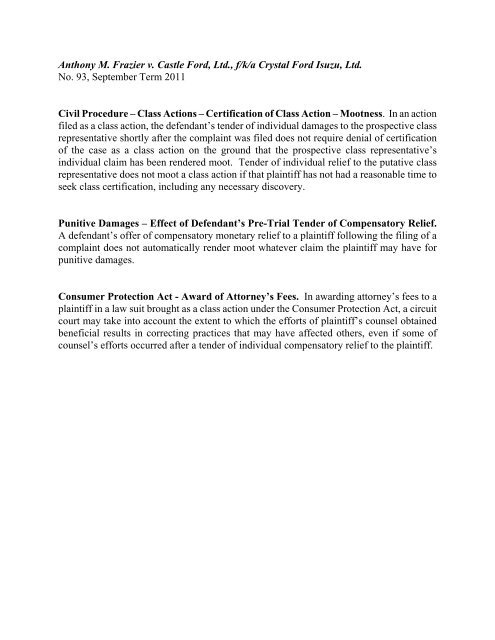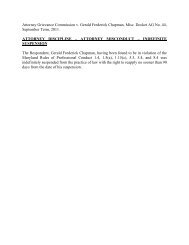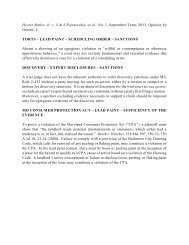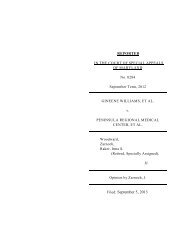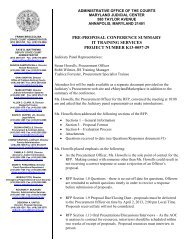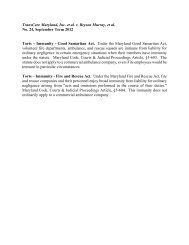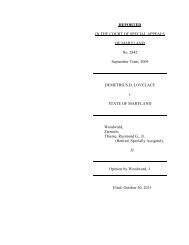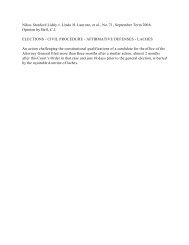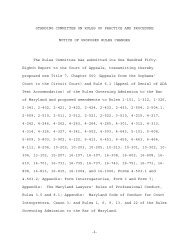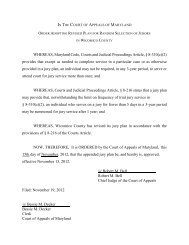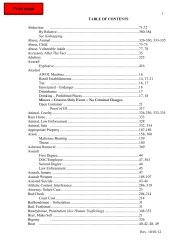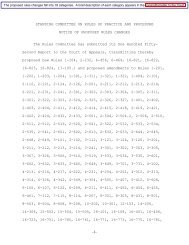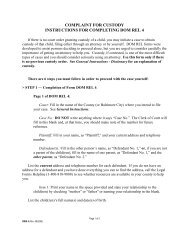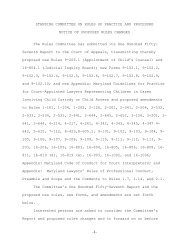Anthony M. Frazier v. Castle Ford, Ltd., f/k/a ... - Maryland Courts
Anthony M. Frazier v. Castle Ford, Ltd., f/k/a ... - Maryland Courts
Anthony M. Frazier v. Castle Ford, Ltd., f/k/a ... - Maryland Courts
You also want an ePaper? Increase the reach of your titles
YUMPU automatically turns print PDFs into web optimized ePapers that Google loves.
<strong>Anthony</strong> M. <strong>Frazier</strong> v. <strong>Castle</strong> <strong>Ford</strong>, <strong>Ltd</strong>., f/k/a Crystal <strong>Ford</strong> Isuzu, <strong>Ltd</strong>.<br />
No. 93, September Term 2011<br />
Civil Procedure – Class Actions – Certification of Class Action – Mootness. In an action<br />
filed as a class action, the defendant’s tender of individual damages to the prospective class<br />
representative shortly after the complaint was filed does not require denial of certification<br />
of the case as a class action on the ground that the prospective class representative’s<br />
individual claim has been rendered moot. Tender of individual relief to the putative class<br />
representative does not moot a class action if that plaintiff has not had a reasonable time to<br />
seek class certification, including any necessary discovery.<br />
Punitive Damages – Effect of Defendant’s Pre-Trial Tender of Compensatory Relief.<br />
A defendant’s offer of compensatory monetary relief to a plaintiff following the filing of a<br />
complaint does not automatically render moot whatever claim the plaintiff may have for<br />
punitive damages.<br />
Consumer Protection Act - Award of Attorney’s Fees. In awarding attorney’s fees to a<br />
plaintiff in a law suit brought as a class action under the Consumer Protection Act, a circuit<br />
court may take into account the extent to which the efforts of plaintiff’s counsel obtained<br />
beneficial results in correcting practices that may have affected others, even if some of<br />
counsel’s efforts occurred after a tender of individual compensatory relief to the plaintiff.
IN THE COURT OF APPEALS OF<br />
MARYLAND<br />
No. 93<br />
September Term, 2011<br />
ANTHONY M. FRAZIER<br />
v.<br />
CASTLE FORD, LTD., F/K/A<br />
CRYSTAL FORD ISUZU, LTD.<br />
Bell, C.J.<br />
Harrell<br />
Battaglia<br />
Greene<br />
Adkins<br />
Barbera<br />
McDonald,<br />
JJ.<br />
Opinion by McDonald, J.<br />
Harrell and Battaglia, JJ., dissent.<br />
Filed: January 24, 2013
<strong>Maryland</strong> Rule 2-231 allows a plaintiff to prosecute a civil action on behalf of a class<br />
of similarly situated persons. In order to do so, the prospective “class representative” must<br />
demonstrate that the class members and the claims asserted on their behalf satisfy certain<br />
criteria set forth in the rule and that the prospective class representative will “fairly and<br />
adequately” represent the class. The circuit court in which the complaint is filed is to<br />
determine whether those criteria are met and whether to “certify” the case as a class action<br />
“as soon as practicable after commencement of the action.”<br />
In this case, we are asked to decide the consequences when a plaintiff seeks to<br />
prosecute a case as a class action and the defendant tenders individual compensatory relief<br />
to the plaintiff – prior to any determination whether the case may appropriately be brought<br />
as a class action. In particular, the following three questions are before us:<br />
1 - Does the tender require the court to deny class certification?<br />
2 - Is an award of punitive damages foreclosed by the tender of individual<br />
compensatory damages?<br />
3 - Is an award of attorney’s fees to the plaintiff under a fee-shifting provision<br />
of the Consumer Protection Act limited to fees incurred before the tender?<br />
For the reasons that follow, we answer each of these questions “no.”
Background<br />
Class Action Complaint<br />
Petitioner <strong>Anthony</strong> <strong>Frazier</strong> commenced this action by filing a complaint in the Circuit<br />
Court for Montgomery County on July 27, 2007, naming Respondent Crystal <strong>Ford</strong> Isuzu,<br />
<strong>Ltd</strong>. (“Crystal <strong>Ford</strong>”) as defendant. 1 The complaint alleged that Crystal <strong>Ford</strong> sold Mr. <strong>Frazier</strong><br />
an extended warranty for his 2003 <strong>Ford</strong> Explorer on or about December 23, 2004. According<br />
to the complaint, the salesperson told Mr. <strong>Frazier</strong> that the extended warranty would last for<br />
48 months from the date of purchase or 100,000 miles, whichever occurred first. In fact, the<br />
duration of the type of extended warranty sold to Mr. <strong>Frazier</strong> was calculated from the “build<br />
date” of the automobile. 2 As a result, the extended warranty actually expired on October 30,<br />
2006, more than 2 years earlier than Mr. <strong>Frazier</strong> had been led to believe.<br />
The complaint alleged that, because the warranty expired earlier than promised, Mr.<br />
<strong>Frazier</strong> incurred unanticipated repair expenses when he had his car serviced within the fouryear<br />
period following purchase of the warranty. According to the complaint, when Mr.<br />
<strong>Frazier</strong> complained to Crystal <strong>Ford</strong>, the salesperson advised that there was nothing she could<br />
do, as the actual terms of the warranty contract measured the four years from the “build date”<br />
1 Subsequent to the events that led to this litigation, Crystal <strong>Ford</strong> operated under the<br />
name “<strong>Castle</strong> <strong>Ford</strong> <strong>Ltd</strong>.” For the sake of simplicity, we adopt the same convention as the<br />
parties and will refer to the Respondent as “Crystal <strong>Ford</strong>.”<br />
2 Crystal <strong>Ford</strong> concedes that it erred in explaining the warranty to Mr. <strong>Frazier</strong>.<br />
According to Crystal <strong>Ford</strong>, due to the number of miles recorded on his car’s odometer, Mr.<br />
<strong>Frazier</strong> received a new car warranty that ran from the “in-service” date of the vehicle rather<br />
than a used car warranty that would have run from the date of purchase of the warranty.<br />
2
of the car even though the application for the warranty stated a longer duration. According<br />
to the complaint, the salesperson told Mr. <strong>Frazier</strong> she had sold other extended warranties with<br />
the same discrepancy.<br />
Following the discussion with the salesperson, Mr. <strong>Frazier</strong> retained counsel, who<br />
wrote a letter to Crystal <strong>Ford</strong> seeking compensation for the unexpected repair expenses as<br />
well as other repairs anticipated within the four-year period. No response was received from<br />
Crystal <strong>Ford</strong>, and Mr. <strong>Frazier</strong> filed his complaint two weeks later.<br />
The complaint asserted two causes of action – one for unfair and deceptive trade<br />
practices, in violation of the Consumer Protection Act, 3 and the other for common law fraud.<br />
The complaint sought compensatory damages, as well as declaratory and injunctive relief,<br />
punitive damages, and attorney’s fees. 4 Mr. <strong>Frazier</strong> purported to bring his action “on behalf<br />
of the entire class of persons similarly situated” – described in the complaint as residents of<br />
<strong>Maryland</strong> who had purchased <strong>Ford</strong> extended warranties from Crystal <strong>Ford</strong> during the<br />
previous four years. The complaint requested, among other things, that the court certify the<br />
action as a class action.<br />
Mr. <strong>Frazier</strong> did not immediately file a motion for class certification, but sought<br />
discovery from Crystal <strong>Ford</strong> concerning warranties Crystal <strong>Ford</strong> had sold to other customers.<br />
3 <strong>Maryland</strong> Code, Commercial Law Article (“CL”), §§13-301, 13-408.<br />
4 Attorney’s fees are available in a private action brought under the Consumer<br />
Protection Act. CL §13-408(b).<br />
3
Tender of Individual Relief<br />
After the filing of the complaint, Crystal <strong>Ford</strong> paid to extend Mr. <strong>Frazier</strong>’s warranty<br />
through December 31, 2008, approximately four years from the date it had sold him the<br />
extended warranty. As a result, <strong>Ford</strong> ESP North America sent Mr. <strong>Frazier</strong> a check for the<br />
amounts he had paid for the repairs (minus a $100 deductible) during the period that his car<br />
would have been covered by the warranty that he had intended to purchase. Mr. <strong>Frazier</strong> did<br />
not cash the check.<br />
Dispositive Motions<br />
Crystal <strong>Ford</strong> filed an answer to the complaint and subsequently filed a motion for<br />
summary judgment, a motion to deny class certification, and a motion for a protective order<br />
seeking to limit discovery. Mr. <strong>Frazier</strong> filed a motion to compel discovery. As of the date<br />
of the hearing on those motions, Mr. <strong>Frazier</strong> had not filed his own motion to certify the class.<br />
On February 20, 2008, the Circuit Court issued an oral opinion from the bench in<br />
which it granted Crystal <strong>Ford</strong>’s motion to deny class certification; and granted in part Crystal<br />
<strong>Ford</strong>’s motion for summary judgment, leaving open the issue of attorney’s fees for a<br />
subsequent hearing. 5<br />
In explaining its decision to deny class certification, the court stated:<br />
[Mr. <strong>Frazier</strong>] clearly is no longer a member of any class<br />
because he’s been made whole, so really, he has no interest as<br />
5 The Circuit Court also denied Mr. <strong>Frazier</strong>’s motion to compel discovery, and denied<br />
Crystal <strong>Ford</strong>’s motion for a protective order on the grounds that it was moot. Mr. <strong>Frazier</strong><br />
appealed the ruling on his motion to compel. The Court of Special Appeals did not reach that<br />
issue on the basis that it was moot given its ruling on the other issues on appeal. Neither<br />
discovery motion is before us.<br />
4
far as this court can see to put forward, and to indicate that he is<br />
acting on behalf of a class.<br />
I also agree with the defendant’s position that the, there’s<br />
not a uniformity in regards to what the individual claimants<br />
would have to put forward. I don’t think at all, having reviewed<br />
Rule 2-231, having reviewed the case law, and having reviewed<br />
this individual case, that a class action certification would be<br />
appropriate.<br />
I really don’t see that <strong>Anthony</strong> <strong>Frazier</strong> is a class plaintiff.<br />
And as I said earlier, I do think that he has been made whole.<br />
So I don’t think that he is, has really any interest in common<br />
with the other yet to be identified prospective claimants.<br />
As to the motion for summary judgment, the court said:<br />
Now, in regards to the motion for summary judgment,<br />
and as an alternative, I believe that the defendants were arguing<br />
that the claim was moot. And certainly, I think I would agree<br />
with the fact that the claim is somewhat moot, because what was<br />
being asked for really pertains to the class motion. And it says,<br />
“Demand judgment for the class plaintiffs, members of his<br />
class,” and then it goes on, the prayers for relief say<br />
“compensatory damages in an amount equal to the cost of all of<br />
the <strong>Ford</strong> extended service plans.” Well that’s been worked out<br />
already. That has been provided to this individual plaintiff.<br />
“Appropriate injunction to declaratory relief to protect<br />
this class.” That’s really not appropriate because I’ve denied the<br />
motion – actually, I granted the motion to deny the class<br />
certification.<br />
“Punitive damages,” that’s clearly not appropriate.<br />
On September 3, 2008, a hearing was held as to the appropriate award for attorney’s<br />
fees before another judge of the Circuit Court. At this hearing, the court was informed that<br />
Crystal <strong>Ford</strong> had contacted other customers who had purchased warranties to ensure that the<br />
5
warranties conformed to the representations made at the time they were sold. (According to<br />
Crystal <strong>Ford</strong>’s counsel, this process was half completed at the time of the February hearing<br />
on the motion for summary judgment). The Circuit Court determined that the efforts of<br />
counsel for Mr. <strong>Frazier</strong> to obtain class certification had helped motivate Crystal <strong>Ford</strong> to<br />
correct the warranties of other members of the putative class. The court decided that, even<br />
though class certification had ultimately been denied, those efforts should be given weight<br />
in the award of attorney’s fees. The court therefore granted Mr. <strong>Frazier</strong> attorney’s fees for<br />
all of the work done by his counsel both before and after Crystal <strong>Ford</strong> had tendered him<br />
individual relief.<br />
Appeal<br />
Both parties appealed to the Court of Special Appeals. That court, in a published<br />
opinion, affirmed the Circuit Court rulings. <strong>Frazier</strong> v. Crystal <strong>Ford</strong>, <strong>Ltd</strong>., 200 Md. App. 285,<br />
27 A.3d 583 (2011). Both parties then sought review by this Court, which we granted.<br />
Discussion<br />
Whether a Tender of Relief to a Prospective Class Representative Prior to Class<br />
Certification Requires Denial of Class Certification<br />
Class Actions<br />
The <strong>Maryland</strong> Rules allow for an action to be litigated as a class action when there are<br />
questions of law or fact common to a group of potential litigants who are too numerous to<br />
6
e joined as parties to the action. <strong>Maryland</strong> Rule 2-231(a). 6<br />
One important purpose of this<br />
procedural mechanism is to allow a remedy for modest individual claims. “The aggregation<br />
of individual claims in the context of a classwide suit is an evolutionary response to the<br />
existence of injuries unremedied by the regulatory action of government. Where it is not<br />
economically feasible to obtain relief within the traditional framework of a multiplicity of<br />
small individual suits for damages, aggrieved persons may be without any effective redress<br />
unless they may employ the class-action device.” Deposit Guaranty National Bank v. Roper,<br />
445 U.S. 326, 339 (1980).<br />
Not anyone can prosecute a class action, however. Under the rule, a plaintiff who<br />
seeks to prosecute a class action – to act as the “class representative” – must satisfy certain<br />
prerequisites. See <strong>Maryland</strong> Rule 2-231(a) (requiring that the representative’s claim be<br />
“typical” of the class and that the representative “fairly and adequately” protect the interests<br />
of the class). The case may only proceed as a class action if certified by the court. <strong>Maryland</strong><br />
Rule 2-231(c). 7<br />
And the prosecution of the action is subject to significant oversight by the<br />
6 The <strong>Maryland</strong> rule is based on Rule 23 of the Federal Rules of Civil Procedure, as<br />
the latter was significantly revised in 1966.<br />
7 The rule sets forth certain criteria to be met as a prerequisite to certification:<br />
(b) Unless justice requires otherwise, an action may be<br />
maintained as a class action if the prerequisites of section (a) are<br />
satisfied, and in addition:<br />
(1) the prosecution of separate actions by or against<br />
individual members of the class would create a risk of<br />
(continued...)<br />
7
court. 8<br />
<strong>Maryland</strong> Rule 2-231(f).<br />
7 (...continued)<br />
(A) inconsistent or varying adjudications with respect<br />
to individual members of the class that would establish incompatible<br />
standards of conduct for the party opposing the class, or<br />
(B) adjudications with respect to individual members<br />
of the class that would as a practical matter be dispositive of the<br />
interests of the other members not parties to the adjudications or<br />
substantially impair or impede their ability to protect their interests; or<br />
(2) the party opposing the class has acted or refused to act<br />
on grounds generally applicable to the class, thereby making<br />
appropriate final injunctive relief or corresponding a declaratory relief<br />
with respect to the class as a whole, or<br />
(3) the court finds that the questions of law or fact common<br />
to the members of the class predominate over any questions affecting<br />
only individual members and that a class action is superior to other<br />
available methods for the fair and efficient adjudication of the<br />
controversy. The matters pertinent to the findings include:<br />
(A) the interest of members of the class in individually<br />
controlling the prosecution or defense of separate actions,<br />
(B) the extent and nature of any litigation concerning<br />
the controversy already commenced by or against members of the class,<br />
(C) the desirability or undesirability of concentrating<br />
the litigation of the claims in the particular forum,<br />
(D) the difficulties likely to be encountered in the<br />
management of a class action.<br />
<strong>Maryland</strong> Rule 2-231(b).<br />
8 One may be wary of class action settlements that generate a pot of money for<br />
attorneys, provide only minuscule damages to class members, and otherwise absolve a<br />
(continued...)<br />
8
“Picking off” the Prospective Class Representative<br />
In this case, the complaint alleges that Crystal <strong>Ford</strong>, an automobile dealer,<br />
misrepresented the term of an extended manufacturer’s warranty that Mr. <strong>Frazier</strong> purchased<br />
from the dealer for his car. According to the complaint, Mr. <strong>Frazier</strong> brought the problem to<br />
the attention of Crystal <strong>Ford</strong> both personally and through counsel, but the dealer took no<br />
action to remedy the problem. If Mr. <strong>Frazier</strong>’s experience reflected the dealer’s practice with<br />
respect to extended warranties, that practice would have a significant impact on other<br />
purchasers for whom recourse to legal remedy would not be economically feasible. It is<br />
undisputed that, once Mr. <strong>Frazier</strong> filed a class action complaint, the dealer took the offensive,<br />
tendered individual damages to Mr. <strong>Frazier</strong> and, based on that tender (which apparently was<br />
declined by Mr. <strong>Frazier</strong>), argued that Mr. <strong>Frazier</strong> could not prosecute a class action. The<br />
Circuit Court accepted that reasoning and denied class certification on the ground that the<br />
tender of individual damages disqualified Mr. <strong>Frazier</strong> from representing the class. 9<br />
8 (...continued)<br />
defendant of liability to injured parties. See, e.g., Crawford v. Equifax Payment Services,<br />
Inc., 201 F.3d 877 (7 th Cir. 2000). The rules require judicial vigilance to avoid such abuses.<br />
See <strong>Maryland</strong> Rule 2-213(h) (dismissal or compromise of class action subject to court<br />
approval). In any event, this case concerns the circumstances under which a class action may<br />
be prosecuted, not those under which it may be settled.<br />
9 The court also referred to a lack of “uniformity” – presumably referring to whether<br />
there existed questions of law or fact common to class members. Crystal <strong>Ford</strong> had argued<br />
that common issues did not predominate; however, the trial court appeared to be focused on<br />
the fact that Mr. <strong>Frazier</strong>’s had been “made whole” and therefore had no “interest in common”<br />
with the other members of the class. At the same time, the court denied Mr. <strong>Frazier</strong>’s motion<br />
for discovery related to class certification issues. The Court of Special Appeals did not<br />
address the “uniformity”question. 200 Md. App. at 298 n.4.<br />
9
The Court of Special Appeals affirmed that decision and essentially held that, in<br />
certain circumstances, a defendant may abort a class action prior to class certification by<br />
tendering individual damages to the plaintiff who initiates the case – even if that tender is<br />
declined and regardless of whether the claims are amenable to class litigation or the<br />
individual plaintiff would otherwise qualify as a class representative. This allows a<br />
defendant in such a case to moot a meritorious class action by “picking off” the putative class<br />
representative.<br />
Standard of Review of Certification Decision<br />
A circuit court’s order to grant or deny class certification is to state “findings and<br />
reasons” for the determination, presumably to facilitate later review. <strong>Maryland</strong> Rule 2-<br />
231(c). Such a decision is ordinarily reviewed for abuse of discretion based upon the<br />
“recognition that the basis of the certification inquiry is essentially a factual one, and thus,<br />
deference is due.” Creveling v. GEICO, 376 Md. 72, 90, 828 A.2d 229 (2003). A less<br />
deferential standard of review applies when there is a question whether the court applied the<br />
proper legal standard for certification. Id. (“whether the trial court used a correct legal<br />
standard ... is a question that we review de novo”); see also Phillip Morris v. Angeletti, 358<br />
Md. 689, 726, 752 A.2d 200 (2000).<br />
In this case, the Circuit Court did not articulate its decision on certification as an<br />
application of the criteria of Rule 2-231 to the claims of potential class members. The only<br />
operative fact mentioned in the Circuit Court’s decision was Crystal <strong>Ford</strong>’s tender of<br />
individual relief to Mr. <strong>Frazier</strong>. The legal issue before us is thus whether that tender<br />
10
precluded certification of this action as a class action with Mr. <strong>Frazier</strong> as the representative<br />
plaintiff.<br />
Creveling<br />
This Court previously discussed, but did not decide, this issue in Creveling, supra.<br />
Although the Court affirmed a denial of class certification in that case for other reasons, 10 it<br />
noted that mootness is a “more flexible” concept in the context of class action litigation. 376<br />
Md. at 83-87 n.3. The Court outlined, in a lengthy footnote, the disparate approaches that<br />
courts in other jurisdictions had taken when a defendant, at various stages of the case,<br />
attempts to moot a class action by tendering individual damages to the plaintiff who seeks<br />
to represent the class. Id. It described four different holdings reflected in the case law: (1)<br />
the entire action should be dismissed if the individual plaintiff’s claims are satisfied before<br />
class certification; 11 (2) the entire action should be dismissed if individual relief is tendered<br />
to the named plaintiff before the filing of a motion for class certification; 12 (3) the mootness<br />
of a named plaintiff’s claim does not automatically moot the class action 13 – i.e., the entire<br />
action should not necessarily be dismissed; and (4) satisfaction of the named plaintiff’s claim<br />
10 The Court affirmed the trial court’s determination that there was a lack of<br />
commonality among the claims of the individual members of the putative class – a key factor<br />
under <strong>Maryland</strong> Rule 2-231 in whether a class should be certified.<br />
11 E.g., Cruz v. Farquharson, 252 F.3d 530, 533 (1 st Cir. 2001); DeCoteau v. Nodak<br />
Mut. Ins. Co., 636 N.W.2d 432, 437 (N.D. 2001)<br />
12 E.g., Yu v. IBM, 732 N.E.2d 1173, 1178-79 (Ill. App. 2000).<br />
13 E.g., Encarnacion v. Barnhart, 180 F.Supp.2d 492, 498 (S.D.N.Y. 2002); Liles v.<br />
Am. Corrective Counseling Servs., 201 F.R.D. 452, 455 (S.D. Iowa 2001).<br />
11
after a denial of class certification does not bar appeal of that denial 14 – and presumably<br />
would not bar prosecution of the class action if the denial is overturned on appeal.<br />
In its opinion in Creveling, this Court explicitly did not choose among these<br />
approaches, but emphasized that “our restraint under the circumstances of this case does not<br />
constitute an endorsement of tendering payment to named plaintiffs with the goal of<br />
annulling class action litigation. ... ‘[T]he notion that a defendant may short-circuit a class<br />
action by paying off the class representatives either with their acquiescence or ... against their<br />
will, deserves short shrift. Indeed, were it so easy to end class actions, few would survive.’”<br />
Creveling, 376 Md. at 83-87 n.3 (quoting Roper v. Consurve, Inc., 578 F.2d 1106, 1110 (5 th<br />
Cir. 1978), aff’d on other grounds, 445 U.S. 326 (1980)).<br />
Assessing the Consequences of a Tender of Individual Relief<br />
While a rule that a defendant may moot a putative class action by tendering individual<br />
damages prior to certification of the class is a bright line rule, it is not a wise one. The<br />
circumstances of this case may illustrate why. If we accept the facts as alleged in the<br />
complaint, the automobile dealer made no effort to rectify the situation until the class action<br />
complaint was filed, but then immediately took action to moot it by tendering individual<br />
damages to the plaintiff shortly after the complaint was filed and before the plaintiff had any<br />
reasonable opportunity to seek class certification or to conduct discovery addressed to the<br />
14 E.g., United States Parole Commission v. Geraghty, 445 U.S. 388 (1980); Deposit<br />
Guaranty National Bank v. Roper, 445 U.S. 326 (1980).<br />
12
merits of class certification. 15<br />
If all a defendant need do to defeat a class action is to satisfy<br />
the class representative’s claim immediately after suit is filed, many meritorious class actions<br />
will never get off the ground. It will be particularly tempting to “pick off” a putative class<br />
representative in cases where the underlying conduct affected many people but each claim,<br />
including the class representative’s, is small or moderate in size – a type of case for which<br />
the class action procedure was devised. 16<br />
Perhaps for that reason, in recent years courts in other jurisdictions have held that,<br />
even prior to the filing of a motion for class certification, an offer of judgment for the full<br />
amount of the putative representative’s individual claim does not automatically moot the<br />
class claims. E.g., Pitts v. Terrible Herbst, Inc. 653 F.3d 1081 (9 th Cir. 2011); Lucero v.<br />
Bureau of Collection Recovery, Inc., 639 F.3d 1239 (10 th Cir. 2011); Weiss v. Regal<br />
Collections, 385 F.3d 337 (3d Cir. 2004); Jackson v. Southern Auto Finance, 988 So.2d 721<br />
(Fla. Ct. App. 2008); cf. Sandoz v. Cingular Wireless, LLC, 553 F.3d 913 (5 th Cir. 2008)<br />
(offer of judgment to representative plaintiff does not moot proposed “collective action”<br />
under federal Fair Labor Standards Act); but see Barber v. American Airlines, Inc., 948<br />
N.E.2d 1042, 1046 (Ill. 2011) (tender of individual relief to prospective class representative<br />
15 In many situations, the information critical to merits of class certification will be<br />
solely in the possession of the defendant.<br />
16 Mace v. Van Ru Credit Corp., 109 F.3d 338, 344 (7th Cir. 1997) (“The policy at the<br />
very core of the class action mechanism is to overcome the problem that small recoveries do<br />
not provide the incentive for any individual to bring a solo action prosecuting his or her<br />
rights. A class action solves this problem by aggregating the relatively paltry potential<br />
recoveries into something worth someone’s (usually an attorney’s) labor.”).<br />
13
prior to filing of motion for class certification required dismissal of complaint).<br />
Pitts v. Terrible Herbst, supra, is illustrative. In that case, Pitts filed a class action<br />
lawsuit against his employer, Terrible Herbst, alleging violations of state and federal labor<br />
laws and breach of contract. Pitts then sought discovery of information concerning potential<br />
class members, Terrible Herbst refused to comply, and Pitts filed a motion to compel<br />
discovery. While that motion to compel was pending, Terrible Herbst tendered Pitts an offer<br />
of judgment of individual damages and attorney’s fees 17 – which Pitts declined – and then<br />
moved to dismiss the case. Although the district court held that a tender of individual<br />
damages does not necessarily moot a class action, it found that Pitts had failed to file a<br />
motion to certify a class in a timely manner. It held that the failure to do so rendered the case<br />
moot 18 and ordered the defendant to pay the tendered settlement.<br />
On appeal, the Ninth Circuit held that a court should not dismiss a class action as moot<br />
17 The offer was made pursuant to Rule 68 of the Federal Rules of Civil Procedure,<br />
which encourages settlements by shifting costs in certain circumstances to a party who<br />
declines a pre-trial settlement offer. Under the rule, a defendant may make a pre-trial offer<br />
of judgment to a plaintiff. If the plaintiff does not accept the offer and does not obtain a<br />
more favorable result at trial, the plaintiff is liable for post-offer costs. There is no equivalent<br />
cost-shifting provision in the <strong>Maryland</strong> rules.<br />
18 The court dismissed the case for lack of subject matter jurisdiction under Article III<br />
of the federal Constitution, under which the federal judicial power extends to “cases or<br />
controversies.” Relying on several Supreme Court decisions, the Ninth Circuit concluded<br />
that the “case or controversy” requirement could be satisfied by the “relation back” of class<br />
certification to the filing of the complaint in appropriate circumstances. See Sosna v. Iowa,<br />
419 U.S. 393 (1975), Gerstein v. Pugh, 420 U.S. 103 (1975), Deposit Guaranty National<br />
Bank v. Roper, 445 U.S. 326 (1980), County of Riverside v. McLaughlin, 500 U.S. 44 (1991).<br />
We, of course, need not address this issue.<br />
14
when a defendant attempts to pick off a prospective class representative before a motion for<br />
certification can reasonably be filed:<br />
If the named plaintiff can still file a timely motion for class<br />
certification, the named plaintiff may continue to represent the<br />
class until the district court decides the class certification issue.<br />
Then, if the district court certifies the class, ... the case may<br />
continue despite full satisfaction of the named plaintiff's<br />
individual claim because an offer of judgment to the named<br />
plaintiff fails to satisfy the demands of the class. Conversely, if<br />
the district court denies class certification, ... the plaintiff may<br />
still pursue a limited appeal of the class certification issue. Only<br />
once the denial of class certification is final does the defendant’s<br />
offer – if still available – moot the merits of the case because the<br />
plaintiff has been offered all that he can possibly recover<br />
through litigation.<br />
653 F.3d at 1092 (citations omitted).<br />
The Ninth Circuit next considered whether Pitts had waited too long to file a motion<br />
for class certification. It noted that Pitts had sought discovery which the defendant had<br />
refused to answer and that, at the time the case was dismissed, “the court had not yet ruled<br />
on his motion to compel the production of certain documents that, in his view, were crucial<br />
to the class certification decision. Pitts repeatedly and timely informed the court – in his<br />
motion to compel, at the hearing held for this motion, and in his motion to extend the initial<br />
discovery deadline – that he was awaiting the court’s ruling prior to filing a motion for class<br />
certification. The court, however, never ruled on the motion to compel.” 653 F.3d at 1092-<br />
93. The appellate court reasoned that, in the absence of a ruling on the motion to compel or<br />
notice to the plaintiff that he would be expected to file a motion for class certification by a<br />
certain date without such a ruling, he could not be faulted for failing to file a timely<br />
15
certification motion. Id. The court summarized:<br />
Id.<br />
Under these circumstances—where the court had extended the<br />
initial discovery deadline at the time of its ruling, where a<br />
motion to compel the production of documents allegedly crucial<br />
to the class certification decision had been filed well in advance<br />
of the initial discovery deadline and was still pending, where<br />
neither the local rules nor the court’s own scheduling order<br />
imposed a deadline for seeking class certification, and where the<br />
scheduling order actually suggested that a motion for class<br />
certification could be filed even after the end of discovery—the<br />
district court abused its discretion in finding that Pitts could no<br />
longer file a timely motion to certify a class.<br />
In our view, the better rule is to adopt the approach reflected in Pitts and the other<br />
cases cited above and hold that a tender of individual relief to the putative class<br />
representative does not moot a class action if the individual plaintiff has not had a reasonable<br />
opportunity to seek class certification, including any necessary discovery. 19<br />
That<br />
determination will require a careful assessment by a trial court. Because the Circuit Court<br />
in this case apparently believed that the tender of individual relief prior to class certification,<br />
by itself, mooted the class action, we will remand the case for reconsideration by the Circuit<br />
Court. On remand, the Circuit Court can determine whether Mr. <strong>Frazier</strong> has had an adequate<br />
19 See Lucero, supra, 639 F.3d at 1250 (in the absence of undue delay in filing a<br />
motion for class certification, “a named plaintiff in a proposed class action for monetary<br />
relief may proceed to seek timely class certification where an unaccepted offer of judgment<br />
is tendered in satisfaction of the plaintiff’s individual claim before the court can reasonably<br />
be expected to rule on the class certification motion”); Weiss, supra, 385 F.3d at 347-49<br />
(stating that “reference to the bright line event of the filing of the class certification may not<br />
always be well-founded” and holding that a class action is not mooted by an offer of<br />
individual judgment in the absence of undue delay in filing the certification motion).<br />
16
opportunity to file a timely motion for class certification and, if it permits him to file such<br />
a motion, articulate “findings and reasons” related to the criteria of Rule 2-231 as to whether<br />
or not a class should be certified.<br />
Whether Punitive Damages May be Awarded if a Defendant Has Tendered Compensatory<br />
Damages<br />
In his complaint Mr. <strong>Frazier</strong> sought an award of punitive damages on behalf of<br />
himself and other prospective class members with respect to the fraud count of his<br />
complaint. 20 After Crystal <strong>Ford</strong> tendered compensatory relief to Mr. <strong>Frazier</strong>, it argued that,<br />
as a result, his claims for additional individual relief were moot. The Circuit Court awarded<br />
summary judgment with respect to the remainder of his claim for punitive damages.<br />
An award of punitive damages may be made in a case of fraud when the defendant<br />
acts with “actual malice” – that is, makes a misrepresentation with intent to deceive and<br />
“actual knowledge” of the falsity of the representation. See Hoffman v. Stamper, 385 Md.<br />
1, 41-43, 867 A.2d 276 (2005) (distinguishing “actual knowledge,” including a “wilful<br />
refusal to know,” from the lesser standard of “reckless indifference to the truth”). In general,<br />
there must be an underlying compensatory damages award with respect to a particular injury<br />
in order for a fact-finder to award punitive damages for that injury. Caldor, Inc. v. Bowden,<br />
330 Md. 632, 662, 625 A.2d 959 (1993). In Caldor, this Court held that there must be a<br />
compensatory damages foundation for each count with respect to which punitive damages<br />
20 Punitive damages are not available in a private cause of action under the Consumer<br />
Protection Act. Hoffman v. Stamper, 385 Md. 1, 49, 867 A.2d 276 (2005).<br />
17
are awarded; the Court rejected an argument that an award of compensatory damages on one<br />
count of a multi-count complaint could support an award of punitive damages as to other<br />
counts. Id. As the Court noted, “one of the purposes of punitive damages is to punish the<br />
wrongs of the defendant. The requirement of a compensatory damages foundation protects<br />
defendants from being punished for acts that the trial court determines the defendant did not<br />
commit.” Id. at 663.<br />
In this case, the Circuit Court concluded that punitive damages were “clearly not<br />
appropriate,” though that court did not explain its conclusion. On appeal, the Court of<br />
Special Appeals affirmed that conclusion on the basis that no further compensatory damages<br />
could be awarded, as Mr. <strong>Frazier</strong> had already been tendered the full amount of his actual<br />
damages. Citing Caldor and similar cases, the intermediate appellate court reasoned that the<br />
tender eliminated the foundation of compensatory damages that is a prerequisite to an award<br />
of punitive damages. That extrapolation of the rationale of Caldor, however, is unwarranted.<br />
An issue is moot if, at the time it is before the court, there is no longer an existing<br />
controversy between the parties, so that there is no longer any effective remedy that the court<br />
can provide. Attorney General v. Anne Arundel County School Bus Contractors Ass’n., 286<br />
Md. 324, 327, 407 A.2d 749 (1979) (dismissing an appeal as moot). <strong>Courts</strong> generally decide<br />
whether a matter is moot as a result of a tender of relief by examining whether the tender<br />
encompasses all of the relief to which a party may be entitled. Compare Holstein v. City of<br />
Chicago, 29 F.3d 1145 (7th Cir. 1994) (defendant’s offer to pay all costs incurred by<br />
plaintiffs as a result of admittedly illegal towing of plaintiffs’ vehicles meant that “there is<br />
18
Whether an Award of Attorney’s Fees May Encompass Efforts Subsequent to Tender<br />
As the Court of Special Appeals correctly indicated, a trial court has a significant<br />
degree of discretion in determining a reasonable attorney’s fee award under a fee-shifting<br />
statute such as the Consumer Protection Act. In this case, the Circuit Court relied upon a<br />
decision of the Court of Special Appeals in a case concerning an award of attorney’s fees<br />
under the Consumer Protection Act and identified the following factors, derived from Rule<br />
1.5(a) of the <strong>Maryland</strong> Lawyers’ Rules of Professional Conduct, to assess the reasonableness<br />
of the requested award:<br />
•the time and labor involved or required;<br />
•the novelty and difficulty of the questions involved;<br />
•the skill requisite to perform the legal services properly;<br />
•the likelihood, if apparent to the client, that the acceptance of the particular<br />
employment will preclude other employment by the lawyer;<br />
•the amount involved and the results obtained;<br />
•the time limitations imposed by the client or by the circumstances;<br />
•the nature and length of the professional relationship with the client;<br />
•the experience, reputation, and ability of the lawyer performing the services;<br />
•whether the fee is fixed or contingent.<br />
See Blaylock v. Johns Hopkins Federal Credit Union, 152 Md. App. 338, 353-54, 831 A.2d<br />
1120 (2003). 22 Applying those factors, the Circuit Court awarded Mr. <strong>Frazier</strong> $20,950.52 in<br />
attorney’s fees.<br />
22 In Blaylock, the intermediate appellate court addressed the issue of whether a<br />
consumer’s settlement with a credit union, without adjudication of the credit union’s fault,<br />
rendered the consumer the prevailing party for the purpose of attorney’s fees. Rejecting the<br />
credit union’s appeal of the award of attorney’s fees, the Court of Special Appeals concluded<br />
that the prerequisite of §13-408(b) – that the party who brings an action under the Consumer<br />
Protection Act be “awarded damages” – should not be narrowly read to require a judgment;<br />
rather, the party may “achieve victory” by a court-approved settlement.<br />
20
As it did in the Circuit Court, Crystal <strong>Ford</strong> appears not to contest that Mr. <strong>Frazier</strong> was<br />
entitled to some award of attorney’s fees under the Consumer Protection Act, CL §13-<br />
408(b). 23<br />
Nor has Crystal <strong>Ford</strong> appeared to contest the reasonableness of the fees with<br />
respect to the services provided. Rather, it disputes only the degree to which Mr. <strong>Frazier</strong>’s<br />
attorney’s fees should be reimbursed. Crystal <strong>Ford</strong> asserts that its liability should be capped<br />
at $3,204 – the amount of attorney’s fees incurred by Mr. <strong>Frazier</strong> up to the time of tender.<br />
Following the tender, the dealership argues, Mr. <strong>Frazier</strong> pursued “fruitless” claims through<br />
“excessive lawyering” by his attorney. It asserts that the trial court committed an error of law<br />
in taking into account the efforts of Mr. <strong>Frazier</strong>’s attorney after the tender of individual relief.<br />
It relies on a recent case in which the Court of Special Appeals reduced the amount of an<br />
attorney’s fee award to account for the prevailing party’s “relative contribution to causing<br />
unnecessary litigation.” Friolo v. Frankel, 201 Md. App. 79, 122, 28 A.3d 79, 778, cert.<br />
granted, 424 Md. 54, 33 A.3d 981 (2011). 24<br />
Crystal <strong>Ford</strong> relies on its post-suit tender of compensatory damages to Mr. <strong>Frazier</strong> as<br />
necessarily limiting Mr. <strong>Frazier</strong>’s entitlement to attorney’s fees for any subsequent actions.<br />
However, as Crystal <strong>Ford</strong> has conceded, in response to the filing of Mr. <strong>Frazier</strong>’s complaint,<br />
23 Before the Circuit Court, Crystal <strong>Ford</strong> also contended that Mr. <strong>Frazier</strong> was not<br />
entitled to an award of attorney’s fees because the dealership had not acted with scienter. On<br />
appeal, Crystal <strong>Ford</strong> conceded that attorney’s fees could be awarded, in light of the fact that<br />
it had not tendered relief to Mr. <strong>Frazier</strong> until after suit had been filed.<br />
24 Although this Court granted a writ of certiorari in Friolo v. Frankel, a subsequent<br />
bankruptcy filing stayed further litigation of that case.<br />
21
it undertook significant measures to identify other customers who had received warranties<br />
with shorter terms than promised and to provide those customers with revised warranties.<br />
While those efforts might well someday form the basis of an argument against an award of<br />
punitive damages, they also support the Circuit Court’s decision to award attorney’s fees to<br />
Mr. <strong>Frazier</strong> for the efforts of his counsel throughout the litigation.<br />
As the Circuit Court reasoned, under the circumstances of this case, Crystal <strong>Ford</strong>’s<br />
concessions illustrate that Mr. <strong>Frazier</strong> lost a battle – in that the Circuit Court granted Crystal<br />
<strong>Ford</strong>’s motions for summary judgment and to deny class certification – but ultimately won<br />
the war, as it is undisputed that his litigation resulted in the revision of warranty contracts by<br />
Crystal <strong>Ford</strong> to match its representations and the expectations of its customers. 25<br />
We agree<br />
with the Court of Special Appeals that the Circuit Court acted within its discretion when it<br />
considered Crystal <strong>Ford</strong>’s correction of extended warranties purchased by other customers<br />
as within “the results obtained” by the efforts of Mr. <strong>Frazier</strong>’s attorney. This seems<br />
25 Crystal <strong>Ford</strong> directs us to several federal cases in which the court considered<br />
whether an attorney’s fee award to a prevailing plaintiff should be reduced because the<br />
plaintiff did not succeed in all respects. See Nigh v. Koons Buick Pontiac GMC, Inc., 478<br />
F.3d 183 (4th Cir. 2006); DeJesus v. Banco Popular de Puerto Rico, 918 F.2d 232, 235 (1st<br />
Cir. 1990); Roger E. Herst Revocable Trust v. Blinds to Go (U.S.) Inc., 2011 U.S. Dist.<br />
LEXIS 147032 (D. Md. Dec. 20, 2011). None of these cases persuades us that the Circuit<br />
Court should have disregarded the prevailing “practical results” conceded by Crystal <strong>Ford</strong>.<br />
22
particularly appropriate in a case under the Consumer Protection Act. 26<br />
Accordingly, the<br />
attorney’s fee award was appropriate under §13-408(b) of the Consumer Protection Act. 27<br />
26 The General Assembly enacted the Consumer Protection Act in order to establish<br />
“minimum statewide standards for the protection of consumers across the State.” CL §§13-<br />
102(b)(1), 13-103(a). The 1986 amendment of the Act to include a private cause of action<br />
was designed “to improve the enforcement” of the Act for the benefit of those consumers.<br />
See Report of Senate Judicial Proceedings Committee concerning Senate Bill 551 (March 7,<br />
1986).<br />
27 As noted above we are remanding this case for further proceedings that may or may<br />
not result in the continuation of the class action Mr. <strong>Frazier</strong> seeks to prosecute. If Mr. <strong>Frazier</strong><br />
should seek an additional award of attorney’s fees in the future, the Circuit Court’s<br />
consideration of such a request should take into account the factors set forth in Rule 1.5(a)<br />
and this Court’s prior decisions concerning the award of attorney’s fees. E.g., Hoffman v.<br />
Stamper, 385 Md. 1, 867 A.2d 276 (2005) (award of attorney’s fees permissible with respect<br />
to Consumer Protection Act count, but not fraud count); Friolo v. Frankel, 373 Md. 501, 819<br />
A.2d 354(2003) (method for determining reasonable fee).<br />
23
JUDGMENT OF THE COURT OF SPECIAL APPEALS<br />
REVERSED IN PART AND AFFIRMED IN PART.<br />
THIS CASE IS REMANDED TO THE COURT OF<br />
SPECIAL APPEALS WITH DIRECTIONS TO<br />
REMAND TO THE CIRCUIT COURT FOR FURTHER<br />
PROCEEDINGS CONSISTENT WITH THIS OPINION.<br />
COSTS IN THIS COURT AND IN THE COURT OF<br />
SPECIAL APPEALS TO BE PAID BY RESPONDENT.<br />
24
IN THE COURT OF APPEALS OF<br />
MARYLAND<br />
No. 93<br />
September Term, 2011<br />
ANTHONY M. FRAZIER<br />
v.<br />
CASTLE FORD, LTD., f/k/a CRYSTAL<br />
FORD ISUZU, LTD.<br />
Bell, C.J.<br />
Harrell<br />
Battaglia<br />
Greene<br />
Adkins<br />
Barbera<br />
McDonald,<br />
JJ.<br />
Dissenting Opinion by Battaglia, J.,<br />
which Harrell, J., joins.<br />
Filed: January 24, 2013
The majority has developed a paradigm that will contribute to confusion among trial<br />
courts regarding class certification, tender of damages, and the appropriateness of punitive<br />
damages when compensatory damages cannot be awarded, so I respectfully dissent. The<br />
better approach to resolving the issues in this case is to determine whether Mr. <strong>Frazier</strong> was<br />
entitled to punitive damages, and then, whether the class action should have been dismissed,<br />
because the appropriate focus is whether the entire relief sought by Mr. <strong>Frazier</strong> had been<br />
tendered by Crystal <strong>Ford</strong>.<br />
The parties disagree as to whether Crystal <strong>Ford</strong>’s tender was sufficient to moot the<br />
claims, focusing on the tender’s effect on Mr. <strong>Frazier</strong>’s demand for punitive damages under<br />
his common law fraud count.<br />
Mr. <strong>Frazier</strong> contends before us that the tender of only the compensatory damages<br />
demanded did not provide him with the full relief to which he was entitled, and so, it was not<br />
sufficient to render his causes of action moot. He argues that punitive damages were not<br />
rendered unavailable by the lack of an award of compensatory damages in this case, because<br />
Crystal <strong>Ford</strong>’s admission that it had committed the alleged wrongs by tendering the requested<br />
compensatory damages obviated the need for a formal award.<br />
Crystal <strong>Ford</strong> responds by arguing that Mr. <strong>Frazier</strong> was afforded all of the<br />
compensatory damages he sought in his complaint, such that he could not be awarded any<br />
more compensatory damages by a trier of fact, rendering punitive damages unavailable as<br />
a matter of law. Crystal <strong>Ford</strong> asserts that, because of the unavailibilty of punitive damages,<br />
it tendered to Mr. <strong>Frazier</strong> all the relief to which he was entitled and “tender of payment by<br />
a defendant of the amount sought as damages in litigation entitles the defendant to dismissal,
as the plaintiff’s claim has been rendered moot by the tender,” relying on A. A. Allen<br />
Revivals, Inc. v. Campbell, 353 F.2d 89 (5th Cir. 1965) (per curiam).<br />
Resolution in cases involving the issue of whether the tender of relief after suit is filed<br />
renders a complaining party’s claims moot depends on whether the tender is of all or less<br />
than all of the relief to which the complaining party is entitled. Cases are legion that postsuit<br />
tender of all the relief a party is entitled to in a complaint is sufficient to moot the case.<br />
E.g. Holstein v. City of Chicago, 29 F.3d 1145 (7th Cir. 1994); A. A. Allen Revivals, Inc. v.<br />
Campbell, 353 F.2d 89 (5th Cir. 1965) (per curiam); Yu v. International Business Machines<br />
Corp., 732 N.E. 2d 1173 (Ill. App. 2000). In Holstein v. City of Chicago, 29 F.3d 1145 (7th<br />
Cir. 1994), for example, the Court of Appeals for the Seventh Circuit consolidated two<br />
appeals, one by Brian Grove and the other by Robert Holstein, from dismissals of claims for<br />
costs associated with allegedly improper towing by the City of Chicago. Id. at 1146. Mr.<br />
Grove’s car was towed on two successive evenings while he was attending baseball games;<br />
he contested the validity of the tows at an administrative hearing, pursuant to a local<br />
ordinance, but lost. Id. Thereafter, Mr. Grove filed a class action complaint seeking to have<br />
the towing statute and the post-tow hearing procedures declared unconstitutional and for the<br />
return of the fees paid for the towing and storage. Id. at 1146-47. After Mr. Grove filed suit,<br />
the City informed him that it had determined that the tows were inappropriate and tendered<br />
to him all the costs he paid as a result of the improper tows; Mr. Grove, however, rejected<br />
the tender. Id. The federal district court judge granted summary judgment to the City then,<br />
based on mootness. Id. at 1147.<br />
2
The Seventh Circuit agreed. In so holding, the Court stated, “Grove may not spurn<br />
this offer of all the damages he is owed and proceed to trial. See Alliance to End Repression<br />
v. City of Chicago, 820 F.2d 873, 878 (7th Cir. 1978). ‘Once the defendant offers to satisfy<br />
the plaintiff’s entire demand, there is no dispute over which to litigate, and a plaintiff who<br />
refuses to acknowledge this loses outright, under Fed. R. Civ. P. 12(b)(1), because he has no<br />
remaining stake.’” Id. at 1147, quoting Rand v. Monsanto Co., 926 F.2d 596, 598 (7th Cir.<br />
1991).<br />
In A. A. Allen Revivals v. Campbell, A. A. Allen Revivals filed a complaint against<br />
the United States to recover taxes erroneously collected, seeking a refund of the taxes paid<br />
with interest. 353 F.2d 89, 90 (5th Cir. 1965) (per curiam). After the complaint had been<br />
filed, the Government tendered to A. A. Allen Revivals the full amount of the taxes collected<br />
with interest, which A. A. Allen Revivals did not accept. Id. The trial judge then dismissed<br />
the complaint as moot because A. A. Allen had received the relief it sought in its complaint.<br />
Id. The Court of Appeals for the Fifth Circuit affirmed, holding that the tender of the full<br />
amount sought in the complaint was sufficient to justify dismissal of the action. Id.<br />
In Yu v. International Business Machines Corp., 732 N.E. 2d 1173 (Ill. App. 2000),<br />
the Illinois intermediate appellate court considered the dismissal of a complaint of a health<br />
care practitioner who had purchased a medical device in 1996 believing that it was “year<br />
2000 (Y2K) compliant,” when, in fact, it was not. Id. at 1175. After being notified that the<br />
upgrade to make the device “year 2000 (Y2K) compliant” would cost him more than $2,000,<br />
Dr. Yu filed a class action suit against the manufacturer for compensatory damages for<br />
3
each of warranty and violations of the Illinois consumer protection statute. Id. After suit<br />
was filed, the manufacturer tendered Dr. Yu a free copy of the software upgrade, which he<br />
accepted. Id. at 1176. The suit was then dismissed as moot, id. at 1177, and the Illinois<br />
intermediate appellate court affirmed, reasoning that Dr. Yu could not point to any damages<br />
caused by the alleged problem other than the money he would have had to spend to upgrade<br />
his software, thereby rendering moot his case. Id. at 1178-79.<br />
Conversely, it is also well-established that tender made following the filing of a<br />
lawsuit, which is less than the full relief to which a complaining party is entitled, is not<br />
sufficient to render the case moot. In Greisz v. Household Bank, the plaintiff purchased a<br />
furnace-air conditioner using a credit card issued by Household Bank. 176 F.3d 1012 (7th<br />
Cir. 1999). When Ms. Greisz received her statement, it listed the purchase price of the unit<br />
as $1,070 more than she believed it should have been. Id. at 1035. Ms. Greisz refused to pay<br />
any part of the charge and filed suit, alleging various violations of federal and state law on<br />
behalf of herself and a putative class. Id. The United States District Court dismissed all of<br />
her claims except part of one count under the Truth in Lending Act, Section 1632(a) of Title<br />
15, United States Code, that entitled her to $1,000 in damages if she could prove a violation<br />
of the Act. Id. at 1039-40. Thereafter, the bank tendered to her $1,200 and reasonable costs<br />
and attorneys’ fees. Ms. Greisz spurned this offer, and the District Court granted summary<br />
judgment to the bank and dismissed the action on the ground that its tender eliminated the<br />
case or controversy. Id. at 1014.<br />
4
The Seventh Circuit affirmed, holding that, because Ms. Greisz did not allege any<br />
injury related to the alleged violations of the Truth in Lending Act, she was entitled to only<br />
statutory damages in the amount of $1,000 and reasonable costs and attorneys’ fees, and the<br />
bank’s tender of more than Ms. Greisz could have recovered even were she to have been<br />
completely successful eliminated any actual controversy for the court to adjudicate. The<br />
Court noted, however, that the Bank’s tender only related to the relief for one claim in the<br />
complaint, and so the dismissal was not actually proper because it was not “an offer to settle<br />
Greisz’s entire case against the bank,” but affirmed the trial court’s ruling because the<br />
plaintiff waived that argument by not raising it. Id. at 1016 (emphasis in original).<br />
In the instant case, the question before us is whether Crystal <strong>Ford</strong>’s tender of<br />
compensatory damages rendered punitive damages under Mr. <strong>Frazier</strong>’s fraud claim<br />
unavailable as a matter of law. The Court of Special Appeals answered this question in the<br />
affirmative, relying on our jurisprudence that punitive damages must have a foundation in<br />
an award of compensatory damages and on the fact that, because it was undisputed that Mr.<br />
<strong>Frazier</strong> received all of the compensatory damages that he sought in his complaint, “there<br />
were no further compensatory damages that <strong>Frazier</strong> could recover at a trial in the instant<br />
case.” <strong>Frazier</strong> v. <strong>Castle</strong> <strong>Ford</strong>, <strong>Ltd</strong>., 200 Md. App. 285, 296, 27 A.3d 583, 589 (2011).<br />
Punitive damages, under the Count of common law fraud, are governed by various<br />
basic principles. Their purpose is to punish a defendant for certain tortious conduct<br />
committed with actual malice, Ellerin v. Fairfax Savings, F.S.B., 337 Md. 216, 241-42, 652<br />
A.2d 1117, 1129-30 (1995), and they are not available, absent an award of compensatory<br />
5
damages. Caldor, Inc. v. Bowden, 330 Md. 632, 661, 625 A.2d 959 (1993); see also Phillip<br />
Morris Inc. v. Angeletti, 358 Md. 689, 773, 752 A.2d 200, 246 (2000); Shabazz v. Bob Evans<br />
Farms, Inc., 163 Md. App. 602, 639, 881 A.2d 1212, 1233-34 (2005). Clearly, the tender<br />
in the present case was not an “award” as a result of a court approved settlement, 1 nor was<br />
any judgment regarding the compensatory damages ever entered in favor of Mr. <strong>Frazier</strong> at<br />
any time, by any court. 2 Each party agrees that Crystal <strong>Ford</strong> paid <strong>Ford</strong> Warranty an amount<br />
of money sufficient to extend Mr. <strong>Frazier</strong>’s warranty to the date alleged to be the end date,<br />
resulting in <strong>Ford</strong> sending Mr. <strong>Frazier</strong> a check for the costs of his car repair except for the<br />
agreed-upon deductible. At the motions’ hearing in this case, Mr. <strong>Frazier</strong>’s attorney<br />
conceded that the tender represented all of the compensatory damages sought:<br />
THE COURT: What damages is your client alleging at the<br />
present time? Because my understanding is that he has been,<br />
everything that he asked for in the complaint, other than<br />
attorneys’ fees, have been addressed, because he received his<br />
extended warranty, the repair bill that he had incurred when he<br />
didn’t have the extended warranty coverage was paid, minus the<br />
$100 deductible.<br />
1<br />
Crystal <strong>Ford</strong> relies on Consolidated Construction Services, Inc. v. Simpson, 372<br />
Md. 434, 813 A.2d 260 (2002) to support its argument that Mr. <strong>Frazier</strong> was not awarded<br />
compensatory damages at trial as a result of its tender. In Consolidated Construction<br />
Services, we were confronted with an attorney who purported to have an attorneys’ lien on<br />
settlement funds held in an escrow account. We held that the plain meaning of the statutory<br />
language, at the relevant time, of “a judgment or award that a client receives as a result of<br />
legal services that the attorney at law performs,” did not include settlement funds as property<br />
to which an attorneys’ lien could attach.<br />
2<br />
The effect of reducing a tender to judgment is explored in ABN Amro<br />
Verzekeringen BV v. Geologistics Americas, Inc., 485 F.3d 85 (2nd Cir. 2007), and may be<br />
an avenue to avoid the consequence of mootness.<br />
6
FRAZIER’S COUNSEL: Yes.<br />
In analyzing the impact of a defending party’s tender of compensatory damages on<br />
a demand for punitive damages, I find persuasive the reasoning of the Illinois intermediate<br />
appellate court in a series of cases regarding tender, to include: Hayman v. Autohaus on<br />
Edens, Inc., 734 N.E. 2d 1012 (Ill. App. 2000), Jones v. William Buick, Inc., 785 N.E. 2d 910<br />
(Ill. App. 2003), and Bates v. William Chevrolet/Geo, Inc., 785 N.E. 2d 53 (Ill. App. 2003).<br />
In Hayman, Mr. Hayman leased a car from Autohaus with the option to purchase the<br />
car at the end of the lease term for a fixed price; when he exercised the option to purchase,<br />
the price was $299 more than the figure on the lease contract. 734 N.E. 2d at 1013. Mr.<br />
Hayman entered into the purchase contract without noticing the discrepancy but upon<br />
returning home and comparing the contracts, he immediately demanded a refund of the $299.<br />
Id. Autohaus informed him that the additional money was a service fee and he could either<br />
keep the car and get no refund or return it for a full refund. Id. Mr. Hayman immediately<br />
began preparations to file suit; Autohaus, however, reversed its position two days after Mr.<br />
Hayman made the demand and tendered the $299 fee in refund while permitting him to keep<br />
the car. Mr. Hayman spurned this offer and filed a class action complaint against the<br />
dealership in which he alleged violations of the Illinois Consumer Fraud and Deceptive<br />
Business Practices Act and common-law fraudulent misrepresentation and demanded<br />
attorneys’ fees and punitive damages, id., but the trial judge granted Autohaus’s motion to<br />
dismiss, reasoning that Mr. Hayman lacked compensatory damages and, therefore, could not<br />
state a cause of action. Id. at 1013-14.<br />
7
On appeal, Mr. Hayman argued that the tender was not sufficient to moot his claims,<br />
because he had also demanded attorneys’ fees, interest, and punitive damages, all of which<br />
could have been supported by the causes of action he plead. Id. at 1014. The court first<br />
noted that Mr. Hayman was only appealing the dismissal of his common-law fraud and<br />
conversion counts, not his counts under the Illinois Consumer Fraud and Deceptive Business<br />
Practices Act, under which he was not entitled to attorneys’ fees. Id.<br />
With respect to Mr. Hayman’s demand for punitive damages, the court first noted that<br />
Autohaus’s tender was a complete refund for the entire amount demanded and, therefore,<br />
“there was no controversy.” Id. The court then reasoned that “[b]ecause full payment, not<br />
a compromise, was offered to Hayman, thus mooting the controversy, the plaintiff had no<br />
right to recover compensatory damages in the trial court” and “[p]unitve damages ‘are in<br />
addition to compensatory damages and cannot be allowed unless actual damage is shown.’”<br />
Id. at 1015. Thus, the court held that punitive damages were not available to Mr. Hayman.<br />
The court’s analysis regarding the effect of tender on punitive damages, however, is<br />
quite different than that employed when it has considered the effect of tender on attorneys’<br />
fees. In Bates v. William Chevrolet/Geo, Inc., 785 N.E. 2d 53 (Ill. App. 2003) and Jones v.<br />
William Buick, Inc., 785 N.E. 2d 910 (Ill. App. 2003), cases in which the Illinois intermediate<br />
appellate court held that dismissal was not proper because the tender of only compensatory<br />
damages was not sufficient to render moot the entire case, because of the pending demand<br />
for attorneys’ fees. In Jones, Ms. Jones purchased a car from William Buick with a down<br />
payment of $500, the balance to be financed by a lender found by William Buick; Ms. Jones<br />
8
was able to take immediate possession of the car. 785 N.E. 2d at 911. Shortly after entering<br />
into the contract, Ms. Jones lost her job, and the lender found by William Buick withdrew<br />
its offer to finance the car. Id. Ms. Jones returned the car and demanded the return of the<br />
down payment via a demand letter from her attorney. Id.<br />
William Buick refunded the $500, but Ms. Jones had already initiated the process of<br />
filing suit under the Illinois consumer protection act and for common law fraud, and did so<br />
shortly after receiving the check. Id. at 912. The trial court dismissed her claims as moot,<br />
given William Buick’s tender of the down payment. Id. On appeal, William Buick relied<br />
upon Hayman v. Autohaus on Edens, Inc., 734 N.E. 2d 1012 (Ill. App. 2000), for the<br />
principle that once William Buick tendered the down payment, Ms. Jones had no injury and<br />
the claim was moot. 785 N.E. 2d at 912. The Illinois intermediate appellate court disagreed<br />
and held that, because Ms. Jones had filed her claim under the Illinois Consumer Fraud and<br />
Deceptive Business Practices Act, she was entitled to attorneys’ fees if she were to prevail<br />
at trial, and William Buick did not tender the full amount of relief requested by Ms. Jones,<br />
such that summary judgment was not appropriate. Id. at 913.<br />
Likewise, in Bates v. William Chevrolet/Geo, Inc., 785 N.E. 2d 53 (Ill. App. 2003),<br />
the same court again considered a tender that did not include attorneys’ fees. Id. at 62. In<br />
that case, Ms. Bates had filed suit alleging common law fraud and a violation of the Illinois<br />
Consumer Fraud and Deceptive Business Practices Act related to her purchase and financing<br />
of a car, id. at 62, and the defending party, William Chevrolet, allegedly tendered to her a<br />
check for all the compensatory damages she requested, but it was returned unopened. Id. at<br />
9
62. After trial, the jury awarded Ms. Bates compensatory and punitive damages. Id. at 55.<br />
On appeal, William Chevrolet asserted that it had tendered the compensatory damages to<br />
plaintiff’s counsel, but “counsel perhaps failed to inform the plaintiff of the offer.” Id. at 62.<br />
It argued that since the alleged tender of compensatory damages was an offer of the “‘full<br />
amount’ owed to plaintiff, there remained no actual controversy and the suit was rendered<br />
moot.” Id. The court disagreed, holding that, because the suit was filed under the Illinois<br />
Consumer Fraud and Deceptive Business Practices Act, the plaintiff was entitled to<br />
attorneys’ fees, so the alleged tender was not for the full amount of relief to which she was<br />
entitled and the case should not have been dismissed as moot. Id.<br />
The distinction drawn by the intermediate appellate court of Illinois between punitive<br />
damages and attorneys’ fees – that attorneys’ fees can accrue after the filing of a suit, while<br />
punitive damages do not – is meaningful. 3<br />
Once post-filing of suit tender of compensatory<br />
damages is accomplished, attorneys’ fees can accrue continuously until the matter is fully<br />
resolved, thus presenting a cognizable harm sufficient to prevent a case from having been<br />
3<br />
While I need not write on the issue of attorneys’ fees, I would note that, under<br />
my analysis, it would be appropriate to award attorneys’ fees to Mr. <strong>Frazier</strong>, because he<br />
achieved a definite result, including for members of the putative class: Crystal <strong>Ford</strong> reformed<br />
their warranties. The majority, however, purports to remand this case to the Circuit Court<br />
for further proceedings, while at the same time awarding counsel fees. The award is without<br />
foundation, because the case is not concluded. It is at the conclusion of those proceedings<br />
that attorneys’ fees should be awarded, not after the majority determines the case should<br />
continue. When we have permitted attorneys’ fees when a remand has occurred, the<br />
attorneys fees have been awarded for claims that have had finality. Hoffmann v. Stamper,<br />
385 Md. 1, 48-49, 867 A.2d 276, 304-05 (2005) (upholding an award of attorneys’ fees,<br />
despite remanding the case, because the only claims that survived on remand did not allow<br />
for an award of attorneys’ fees).<br />
10
endered moot by post-suit tender of compensatory damages, unlike punitive damages. See,<br />
e.g., Bates, 785 N.E. 2d at 62 (“Defendant failed to tender the attorney fees recoverable<br />
under section 10a(c) of the Consumer Fraud Act, and thus, failed to tender the ‘full amount’<br />
owed to plaintiff.”). Punitive damages, thus, should not be available as a matter of law as a<br />
result of the pre-trial tender in the present case. 4<br />
The next step in my analysis is Mr. <strong>Frazier</strong>’s challenge to the denial of class<br />
certification. Crystal <strong>Ford</strong>’s Motion to Deny Class Certification was granted primarily on<br />
the ground that the mootness of Mr. <strong>Frazier</strong>’s individual claim required the dismissal of the<br />
class claims.<br />
<strong>Courts</strong> are split as to whether a motion to certify a class is sufficient to prevent the<br />
entire action from becoming moot when the named representative’s claims become moot or<br />
whether actual certification of a class is necessary, although the latter, in my estimation,<br />
clearly provides the better foundation for identifying class members and their interests. See,<br />
e.g., Wheatley v. Board of Education of Township High School District 205, 459 N.E. 2d<br />
1364 (Ill. 1984) (holding that because no class was certified at the time the individual claims<br />
were dismissed, the class action was properly dismissed); Hayman v. Autohaus on Edens,<br />
Inc., 734 N.E. 2d 1012, 1015 (Ill. App. 2000) (holding that because no class was certified at<br />
the time tender rendered moot Hayman’s claims, dismissal of the entire suit was warranted);<br />
4<br />
While I am cognizant of the fact that punitive damages are intended to punish<br />
the defendant and to deter future wrongful conduct, a defendant that acknowledges its wrong<br />
ways and chooses to pay compensatory damages without an adjudication of liability does not<br />
require further retribution.<br />
11
DeCoteau v. Nodak Mutual Insurance Company, 636 N.W. 2d 432, 437 (N.D. 2001) (“When<br />
a named plaintiff’s individual claim becomes moot before a class has been properly certified<br />
or certification has been denied, courts generally hold dismissal of the action is required.”).<br />
The rationale for this rule is that the interests of the putative class are not actually before the<br />
court until a motion for certification has been granted. See Sosna v. Iowa, 419 U.S. 393, 399,<br />
95 S.Ct. 553, 557, 42 L. Ed. 2d 532, 540 (1975) (“When the District Court certified the<br />
propriety of the class action, the class of unnamed persons described in the certification<br />
acquired a legal status separate from the interest asserted by appellant.”).<br />
The Court of Appeals for the Second Circuit addressed the question of whether a<br />
representative plaintiff’s claims being rendered moot prior to certification being granted also<br />
rendered the entire class action suit moot, in Comer v. Cisneros, 37 F.3d 775 (2nd Cir. 1994).<br />
In that case, Jessie Comer and three others filed a class action suit alleging that the public<br />
housing and assistance programs in Buffalo, New York were discriminatory. In addressing<br />
the question of whether the class action was rendered moot by the defending parties’<br />
voluntary cessation of the alleged discriminatory activity prior to certification of the class,<br />
the court stated that, “in general, if the claims of the named plaintiffs become moot prior to<br />
class certification, the entire class action becomes moot. In contrast, class certification will<br />
preserve an otherwise moot claim.” Id. at 798 (citations omitted).<br />
The Second Circuit noted that the United States Supreme Court identified two<br />
instances in which this general rule does not apply: when an intervenor steps in and when the<br />
claims are “so inherently transitory that the trial court will not have even enough time to rule<br />
12
on a motion for class certification before the proposed representative’s individual interest<br />
expires.” Id. at 799 (internal quotation marks and citation omitted). The court went on to<br />
hold that the claims were not actually moot because the alleged harm was “capable of<br />
repetition but evading review,” id. at 800-01, but the general rule of law holds true: where<br />
a representative plaintiff’s claim has been rendered moot before certification is granted,<br />
dismissal of the entire action is warranted unless the claims fall into either of the enunciated<br />
exceptions. See also Tucker v. Phyfer, 819 F.2d 1030, 1033 (11th Cir. 1987) (“In a class<br />
action, the claim of the named plaintiff, who seeks to represent the class, must be live both<br />
at the time he brings suit and when the district court determines whether to certify the<br />
putative class. If the claim is not live, the Court lacks a justiciable controversy and must<br />
dismiss the claim as moot.”); Sannon v. United States, 631 F.2d 1247, 1252 (5th Cir. 1980)<br />
(holding that the dismissal of a class action suit after the representative plaintiff’s claims<br />
became moot was proper, noting that, “‘[b]ecause the class action was never properly<br />
certified nor the class properly identified by the District Court,’ the decision that the claims<br />
of the purported representative were moot dictated the dismissal of the uncertified ‘class’<br />
action as well,” quoting Bd. of School Comm’rs v. Jacobs, 420 U.S. 128, 130, 95 S.Ct. 848,<br />
850, 43 L.Ed. 2d 74, 78 (1975) (per curiam)).<br />
In the present case, no class had been certified prior to the tender of compensatory<br />
damages, so that the class claims were, in my view, properly dismissed.<br />
The more appropriate line to draw in the sand with respect to the tender of relief to<br />
the named plaintiff in a class action suit is that dismissal of the action is appropriate, if the<br />
13
class has not been certified before the claim has been rendered moot. Essential to my view<br />
is that, from a jurisdictional standpoint, the interests of the putative class are only before the<br />
court once certification has been granted; thus, allowing a named plaintiff to continue a suit<br />
when he or she has no personal interest before the court, and the class’s interests are also not<br />
before the court, leads to the absurd result of allowing a court to continue to adjudicate a case<br />
that presents no actual controversy. I dissent.<br />
Judge Harrell has authorized me to state that he joins this dissenting opinion.<br />
14


